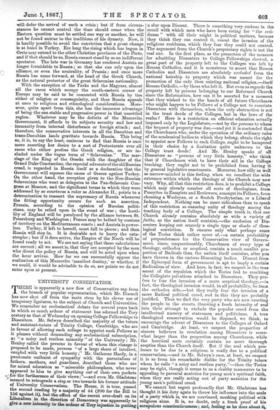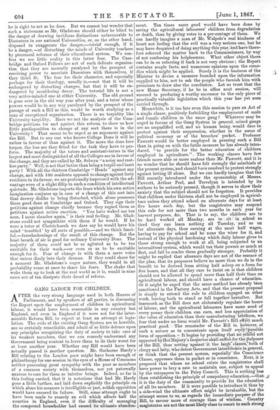UNIVERSITY CONSERVATISM.
THERE is apparently a new flow of Conservative sap from the branch of popular representation, which Mr. Disraeli has now shut off from the main stem by his clever use of temporary ligatures, to the subject of Church and Universities. We remember no ecclesiastical debate for several years back in which so much ardour of statement has adorned the Tory oratory as that of Wednesday on opening College Fellowships to Dissenters. Mr. Selwyn described the majority of the tutors and assistant-tutors of Trinity College, Cambridge, who are in favour of allowing each college to appoint such Fellows as it pleases without demanding any ecclesiastical subscription, as"a noisy and restless minority" of the University ; Mr. Henley called the persons in favour of whom this change is proposed to be made, persons "of a large share of intellect, coupled with very little honesty ;" Mr. Gathorne Hardy, in a passionate outburst of sympathy with the parentalism of fathers, mothers, and guardians, described those who are for mixed education as "miserable philosophers, who never appeared to him to give anything out of their own pockets for the furtherance of their views ;"—and even Mr. Gladstone seemed to retrograde a step or two towards his former attitude of University Conservatism. The Howe, it is true, passed the second reading by a majority of 44 (200 for the Bill to 156 against it), but the effect of the recent over-draft on its Liberalism in the direction of Democracy was apparently to give a new intensity to the ardour of Tory injustice in putting • a slur upon Dissent. There is something very curious in the recoil with which men who have been voting for "the real- dawn" with all their might in political matters, because they think they can control it, resent the invasion of the religions residuum, which they fear they could not control. The argument from the Church's proprietary rights is not the real one. In the first place, as the promoters of the measure for admitting Dissenters to College Fellowships showed, a. great part of the property left to the Colleges was left by Roman Catholics, and it is monstrous to assert that Romaa Catholics and Dissenters are absolutely excluded from the national heirship to property which was meant for the promotion of the only then existing national religion,—itself Roman Catholic, —by those who left it. But even as regards the property left by persons belonging to our Reformed Church since the Reformation, how can it be asserted for a moment that they wished to tie the hands of all future Churchmen who might happen to be Fellows of a College not to associate Dissenters with themselves, when the only obstruction is not in the trust deeds of the Colleges, but in the laws of the realm? Here is a restriction on efficient education actually imposed only by the Legislature,—not by the persons to whom the bequest of property was due,—and yet it is contended that the Churchmen who, under the operation of the ordinary rules of the academical bodies to which they belong, obtain the right to appoint new Fellows in each College, ought to be hampered in their choice by a limitation quite unknown to the College trust deeds! And Mr. Henley speaks of an Dissenters as "persons of very little honesty," who think that if Churchmen wish to have their aid in the College teaching, they ought not to be prohibited from having it by general legislative enactments. Moreover, how silly as well as narrow-minded is this feeling, when we recollect the wide extremes within which the theology of the Church may now vary. Why, all that this restriction does, is to prohibit a College which may already number all sorts of theologians, from Puseyites to Essayists and Reviewers, amongst its Fellows, from choosing a Wesleyan, or a Scotch Presbyterian, or a Liberal Independent. Nothing can be more ridiculous than to speak of this restriction as ensuring unity of theology among the teaching body of a College. The simple truth is, that our Church already contains absolutely as wide a variety Of faiths, as the nation itself contains,—the exclusion of Dis- senters keeping out scarcely a single type or shade of theo- logical conviction. It ensures only what perhaps some of the Tories think rather more of,—a certain probability of preponderance for the Conservative view of Govern- ment, since, unquestionably, Churchmen of every type of theology, orthodox or sceptical, contain a much smaller pro- portion of Radicals than the nation itself contains, after you have thrown in the various Dissenting bodies. Dissent from the Episcopal form of government is apt to imply a certain Radicalism of view. And here, in fact, we suspect is the true secret of the repulsion which the Tories feel to remitting the Collegiate privations attached to Dissenters. They pro- fess to fear the invasion of a more sceptical theology,—in fact, the theological invasion would, in all probability, be from the orthodox side,—but they really fear the invasion of a more Radical political creed, and in this they are probably justified. Thus we find the very party who are now courting the people in the streets, throwing a fresh intensity of zeal into their attempt to exclude the popular creed from the intellectual nursery of statesmen and politicians. A true theological conservatism would be disposed, we think, to encourage the advent of Dissenters to the Colleges of Oxford and Cambridge. At least, we suspect the proportion of sincere believers in revelation among Dissenters is some- what larger than the proportion among Churchmen, while the heretical sects certainly contain no more thorough sceptics than the Church itself. But if the zeal which pro- fesses to be due to a religious, is really due to a political conservatism,—and in Mr. Selwyn's case, at least, we suspect it is so from his remarkable dislike for the Trinity tutors whom he calls "a noisy and restless party,"—then the Tories may be right, though it seems to us a shabby manceuvre to be appealing to parental anxieties for young men's spiritual faith, when they are really acting out of party anxieties for the young men's political creed.
We cannot but regret profoundly that Mr. Gladstone ham thought it his duty again to throw his influence into the Beale of a party which is, we are convinced, masking political with religions aims. It is, no doubt, only a fresh proof of his scrupulous conscientiousness ; and, feeling as he does about Do he is right to act as he does. But we cannot but wonder that such a statesman as Mr. Gladstone should either be blind to the danger of drawing invidious distinctions unfavourable to Dissenters in our national Universities, or, on the other hand, disposed to 'exaggerate the danger,—trivial enough, if it be a danger,—of disturbing the minds Of University teachers by piecemeal reforms of their educational system. We con- fess we see little reality in this latter fear. The Cam- bridge and Oxford Fellows are not of such delicate organiza- tion that they are mentally paralyzed by the prospect of receiving power to associate Dissenters with themselves, if they think fit. The fear for their character, and especially perhaps for their theology, usually is,—not that it will be endangered by disturbing changes, but that it will be en- dangered by mouldering decay. The tutorial life is not a very active-minded one at either University. The old ground is gone over in the old way year after year, and a tutor whose powers would be in any way paralyzed by the prospect of the passage of such a Bill as this, would be worth studying as a man of exceptional organization. There is no torpidity like University torpidity. Have we not the analysis of the Cam- bridge petitions for and against this reform, to show us how little predisposition to change of any sort there is in the University That seems to be urged as an argument against the Bill. But to any one who knows College Dons it will be rather in favour of than against it. The more the dons love torpor, the less are they fitted for the task they have to per- form. The majority of the tutors and assistant-tutors in the largest and most distinguished of all the Colleges are in favour of the change, and they are called by Mr. Selwyn "a noisy and rest- less party." Well, is not that better than being a torpid and inert party? With all the thirteen Cambridge " Heads " against any change, and with 180 residents opposed to change against forty residents in its favour, we are profoundly impressed with the ad- vantage even of a slight fillip to such a condition of intellectual quietude. Mr. Gladstone imports the fears which his own active imagination conjures up in case of a change of this sort into that drowsy dislike to being disturbed, which alone possesses these good dons at Cambridge and Oxford. They sign their petitions against change chiefly because they regard them as petitions against active exertion. "You have waked me too soon, I must slumber again," is their real feeling. Mr. Glad- stone could not sympathize with them if he would. If he were a tutor at Christchurch we dare say he would have his mind 'troubled' by all sorts of possible,—and we think fanci- ful,—foreshadowings of the result of this change. But the least. breath of air is good for ordinary University Dons. The majority of them could not be so agitated as to be too excitable for their work,—or even so as to be excitable enough for it. Fear of change is with them a mere voice that enters dimly into their dreams. if they could share for a moment Mr. Gladstone's eager nature, they would in all probability cease at once to share his fears. The shake that woke them up to look at the real world as it is, would in nine cases out of ten dissipate their dread of reform.































 Previous page
Previous page